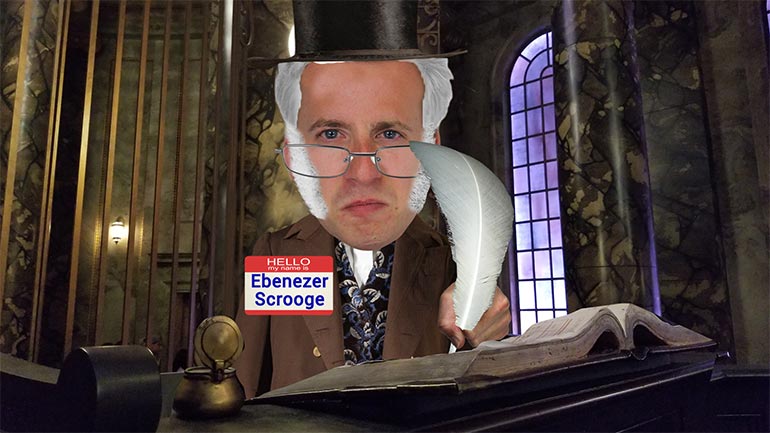ShmoopTube
Where Monty Python meets your 10th grade teacher.
Search Thousands of Shmoop Videos
Tech Videos 99 videos
What is covariance? Covariance is the comparison of how assets move in the markets. Positive covariance is when assets move in tandem, such as when...
What is After Hours Trading/Extended Trading? After hours trading describes any trades made after the market closes or before the market opens. Bec...
What is volatility? In the world of investing, volatility basically means riskiness. It looks at the returns for stocks or indexes, and if they are...
Finance: Are monopolies evil? Should they be regulated? Should they be illegal? 28 Views
Share It!
Description:
Are monopolies evil? Should they be regulated? Should they be illegal? Monopolies in and of themselves, are neither good nor evil. How they conduct their business and the reasons for why they are a monopoly are subject to a variety of factors, which may or may not result in an evil situation that needs to be regulated. In a free market society, private monopolies are generally not beneficial since they can gouge the buying public, such as Theranos and its Epipen treatment, or when Rockefeller owned Standard Oil. However, in the case of Singapore Air, Singapore is a small country and having a single, national airline makes sense as other airlines can fly into Singapore. The financial, political, and security liabilities from having multiple domestic carriers in a country smaller than Manhattan far outweigh any potential benefits, so a state monopoly works in this instance.
- Social Studies / Finance
- Finance / Financial Responsibility
- Life Skills / Personal Finance
- Finance / Finance Definitions
- Life Skills / Finance Definitions
- Finance / Personal Finance
- Courses / Finance Concepts
- Subjects / Finance and Economics
- Finance and Economics / Terms and Concepts
- Terms and Concepts / Bonds
- Terms and Concepts / Company Management
- Terms and Concepts / Ethics/Morals
- Terms and Concepts / Forex
- Terms and Concepts / Incorporation
- Terms and Concepts / Insurance
- Terms and Concepts / International
- Terms and Concepts / Marketing
- Terms and Concepts / Metrics
- Terms and Concepts / Regulations
- Terms and Concepts / Stocks
- Terms and Concepts / Tech
- Terms and Concepts / Trading
- College and Career / Personal Finance
Transcript
- 00:00
Finance allah shmoop our monopolies Evil Should they be regulated
- 00:07
Should they be illegal Alright well big question Here are
- 00:11
monopolies evil And as bill gates used to say well
- 00:15
not a few own one Well okay bill was just
- 00:18
a little bit evil or maybe a lot depending on
Full Transcript
- 00:21
whether or not you came from silicon valley So the
- 00:23
common wisdom among most voting public kind of people is
- 00:27
that monopolies are bad evil and awful Why Because they
- 00:32
can charge anything they want for whatever their product is
- 00:36
They have no competition Keep him honest Well microsoft via
- 00:40
their windows operating system was the greatest monopoly in history
- 00:44
Sorry they're rockefeller And for a long time that company
- 00:47
had massive profit margins until the internet more or less
- 00:51
became the operating system along with all the tools needed
- 00:54
for it And it was all more or less free
- 00:57
ish Wealthy interviewee it took to maintain the windows monopoly
- 01:00
along with regulatory friction eventually killed microsoft's monopoly and well
- 01:05
that was that But for a while microsoft had someth
- 01:08
fifty percent net profit margins about five times the margins
- 01:13
of even the best s and p five hundred companies
- 01:16
Worth noting coca cola and pepsi have what is called
- 01:19
a duopoly The two of them together would be essentially
- 01:24
a monopoly of soda but well they more or less
- 01:28
collude on pricing and terms and elbow out any would
- 01:31
be third editor so their margins are high about twenty
- 01:35
five percent or about half of what monopoly profit margins
- 01:38
give so that's the quote bad stuff unquote a monopoly
- 01:42
brands unfair advantage But if you were a shareholder of
- 01:45
microsoft in the eighties and the first half of the
- 01:48
nineties well you'd be just tickled Have you owned one
- 01:50
hundred shares of that awesome monopoly in nineteen eighty four
- 01:54
and held them fifteen years Well your original investment of
- 01:58
one hundred dollars would have turned into thousands like six
- 02:01
seven eight thousand dollars So what's so bad about making
- 02:05
hundreds of times your money Oh and here's another thing
- 02:08
to think about it and t the big t on
- 02:11
the big board Well t was the big monopoly before
- 02:14
microsoft and it owned local and long distance carriage of
- 02:18
phone calls for half a century Give or take it
- 02:21
had obscene profits in large part by virtue of the
- 02:24
us government granting them federal licenses to operate in various
- 02:29
areas in whatever form they needed Teo you know wire
- 02:32
our country But a number of good things came from
- 02:35
this monopoly one thing being that a teen t never
- 02:37
cut its dividend like most of the other companies did
- 02:40
during the great depression A lot of families lived on
- 02:43
that and not cutting that dividend literally saved the lives
- 02:46
of those families like hundreds of thousands of americans who
- 02:50
lived on it for luxuries like eat food and rent
- 02:53
so on Additionally is part of the monopoly handshake Att
- 02:56
and t was required to wire rural america These guys
- 03:01
remote farmers like if even one home existed forty miles
- 03:06
from pretty much nowhere a teen t had to spring
- 03:09
wires on poles all the way down to dead ends
- 03:12
ville and get that home wired and that served the
- 03:15
country well when farms became factories and well a whole
- 03:18
country could talk to each other without monopoly level profits
- 03:21
gained from more dense population areas Well att and t
- 03:25
never would've had the money or desire to spend a
- 03:28
few hundred thousand dollars it cost to connect that loan
- 03:31
Farmhouse in the boonies to the grid Why was that
- 03:34
so important Well eventually that loan farmhouse made it with
- 03:37
another farmhouse and there were two of them and then
- 03:40
five and then twenty and then three hundred and yes
- 03:42
having ubiquitous connectivity of every living human being in the
- 03:46
country said something about the u s of a that
- 03:49
we took care of all of our people whether city
- 03:52
slicker a redneck and allowed everyone to share in the
- 03:55
opportunities provided by a fancy new technological marvel called the
- 03:59
telephone So our monopolies good bad lukewarm Well hard to
- 04:03
say so Uh maybe monopolies are like pineapples sometimes good
- 04:07
like in a fruity tropical drink and sometimes terrible like
- 04:10
on a pizza Yeah we're just saying you have to
- 04:12
peel off the skin maybe it's better if you do
- 04:15
that and don't bother sending in an angry pineapple pizza
- 04:18
related letter we've got a special place for those in 00:04:21.049 --> [endTime] a shmoop h q huh
Related Videos
GED Social Studies 1.1 Civics and Government
What is bankruptcy? Deadbeats who can't pay their bills declare bankruptcy. Either they borrowed too much money, or the business fell apart. They t...
What's a dividend? At will, the board of directors can pay a dividend on common stock. Usually, that payout is some percentage less than 100 of ear...
How are risk and reward related? Take more risk, expect more reward. A lottery ticket might be worth a billion dollars, but if the odds are one in...







































































































